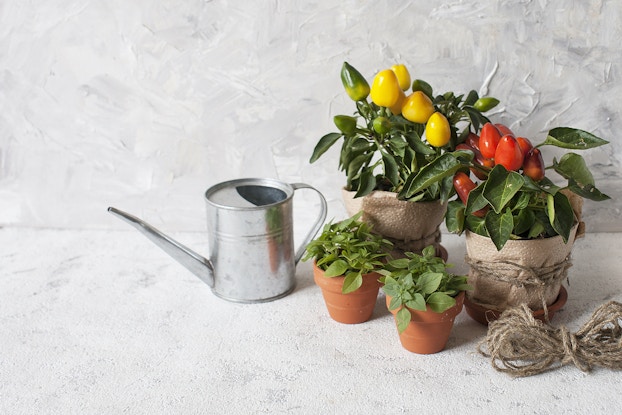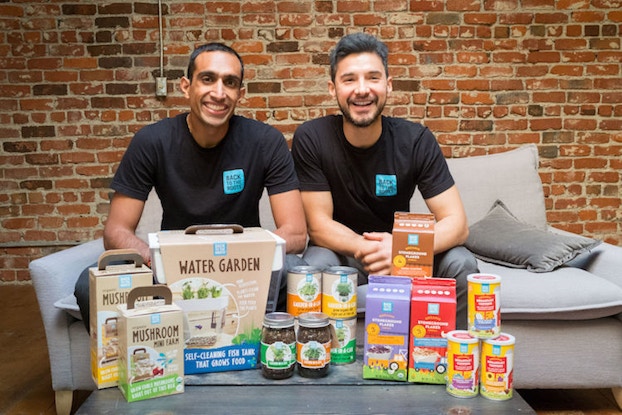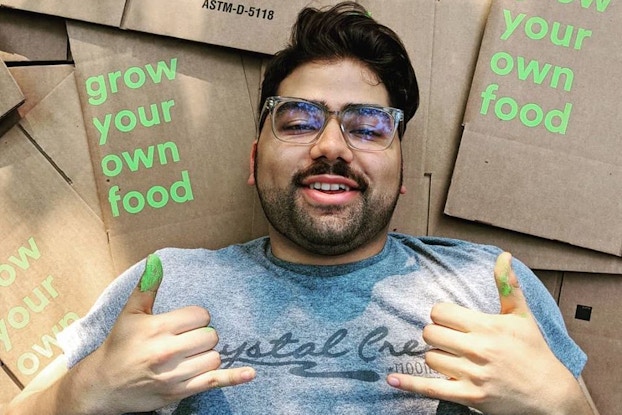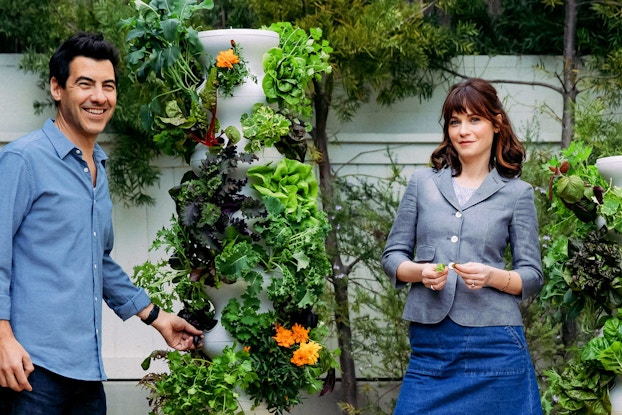
Three fast-growing trends — do-it-yourself (DIY), do-it-for-me (DIFM) and consumers’ ever-burgeoning appetite to eat more locally grown foods, are converging to create a new market opportunity: grow-your-own fresh produce.
Now, three startups — Back to the Roots, Gardenio and Lettuce Grow — are on the road to taking a big bite out of the business by creating an entirely new category: ready-to-grow, edible gardening kits.
The DIY aspect of the business model is pretty clear: Grow your own produce at home. The DIFM element points to the startups’ technology-enabled systems and products that allow consumers to grow their own food without all the work and time-consumption that traditional gardening requires — there’s no need to have a green thumb. And in terms of tapping into the locally grown produce trend, you can’t get much more local than growing food right in your own kitchen, living room or yard.
DIY is far from new. Many Americans have been DIYing forever. But the internet and social media have spread the trend, accelerating the DIY phenomenon over the last few years, turning it into a full-fledged movement.
And DIY gardening is exploding. According to Garden Research, more American households (77%) are gardening than ever before, and increasingly the face of that gardener is a young one. The organization found in its recent national survey that the 18 to 34 age group reached an all-time gardening high.
“The under-35-year-olds are now truly engaged in the full range of gardening activities,” Ian Baldwin, a gardening industry analyst who took part in the Garden Research study, told CO—. “The 18-to-34-year-olds now occupy 29% of all gardening households. It’s a strong sign that they are finally ‘in,’” he said.
Millennials (and other generations) want help with gardening, too, according to the study, and are looking for technology-enabled ways — apps, online tools and the like — to make growing food easier and less time-consuming.
This is where Do-It-For-Me (DIFM), a relatively new concept that fits with the needs and desires of today’s time-pressed consumers to trade money for time, comes in. It’s part of the on-demand economy, which according to research firm CB Insights has been booming over the last few years.
Ready-to-grow edible gardening sits in the middle ground between DIY and DIFM. People still want to grow their own food, but they want it made easier for them, which is what companies like Back to The Roots, Gardenio and Lettuce Grow are doing by using innovation and technology to create near-foolproof vegetable gardening systems.
Numerous consumer studies, including a recent survey from the Gallup Organization, have found that “locally grown” and “locally produced” foods are now even more popular with consumers than organic foods. The order of consumer priority was reversed only a few years ago.
Additionally, food industry market research firm Packaged Facts named local foods, especially fresh produce, as one of its key disruptive industry trends for 2019, calling it “Next Generation Organic.”
Mike Lee, founder and CEO of The Future Market, which explores how we will produce and shop for food over the next 25 years, sees the companies and ready-to-grow tools they’re providing to consumers as an important element in reconnecting people to the source of the food they buy and eat.
“DIY companies and their growing tools help redefine the meaning of local. As the trends show people increasingly flocking to urban centers, these tools are a great way to connect people to the source of their food,” Lee told CO—. “Not all people may be able to go visit a farm on a regular basis, and while these tools are no replacement for a traditional farm, they bring agriculture and growing your own food into the home, and could ignite a renewed passion in understanding where your food comes from,” he said.

Back to the Roots: From an idea hatched in ethics class to big retail’s shelves
Back to the Roots was hatched when co-founders Nikhil Arora and Alejandro Velez met in a business ethics class at the University of California at Berkeley in 2009. That’s when their professor, in discussing sustainability, suggested that mushrooms can grow on recycled coffee grounds, and it might make a good business. Today the company is the pioneer and leader in the ready-to-grow produce niche.
That year, Back to the Roots launched its first ready-to-grow indoor gardening kit, organic mushrooms grown in recycled coffee grounds provided by Peet’s Coffee. It has since introduced several other ready-to-grow indoor gardening kits, including an aquaponics fish tank and herb gardens in cans and jars.
For Back to the Roots, which sells its grow kits online and in big retail chains like Target, Whole Foods Market, Nordstrom, The Home Depot, Lowe’s and others, 2019 was a big year. The startup, which also produces and markets a line of ready-to-eat organic cereal, raised a $3 million Series C investment round led by Central Garden and Pet Company and Blue Scorpion Investments, which it’s using to fuel further growth, co-founder and co-CEO Alejandro Velez told CO—. Back to the Roots has raised over $10 million from a variety of investors and firms over the past decade.
The company is launching over a dozen new products this year and in 2020, Velez and partner, co-founder/co-CEO Nikhil Arora, told CO—, it’s also adding more big retail partners, including Walmart and Costco — the two biggest retailers in the U.S. based on annual revenue.
“It’s a really exciting time for the company,” Arora said. “What started off as a college project has grown into a national brand that’s reconnecting millions of families back to where their food comes from. We’re so excited to offer Back to the Roots in more national retailers and make organic gardening accessible to all. No backyard or green thumb is needed.”
DIY companies and their growing tools help redefine the meaning of local.Mike Lee, founder and CEO, The Future Market
Sustainability
These three companies are capitalizing on the grow-your-own-food trend, sparked by generations of consumers looking for sustainability in their purchasing decisions. Read on for some sustainable business ideas.

Gardenio: A paying membership subscription business after first ‘failing miserably’
Like the founders of Back to the Roots, it was while attending college that the seeds for founder Roman Gonzalez’s startup, Gardenio, an online marketplace for gardeners, were planted.
Gonzalez studied philosophy at Brown University because he was interested in big-picture ideas like the purpose of life. At the same time, he was experimenting with creating different types of foods and drinks, like salsas from unique varieties of tomatoes and craft cocktails using various herbs, spices and barks, which he sold door-to-door in his neighborhood.
After college, when Gonzales was working as a user experience designer, the experiments grew into an interest in growing his own food. But he was no good at it, he told CO—.
“About four years ago I tried growing my own food and failed miserably and didn’t learn a thing,” he said. Gonzalez realized that in launching the business the first time around, he’d strayed from some core user experience principles, such as user experience principles around growing your own food. So he corrected that.
What Gonzalez came up with is a zero waste, outdoor organic food gardening system in pots.
Gardenio launched its first products in March 2018 and is based on a subscription model.
Members receive a self-contained kit with everything needed to get growing: live plants in a grow pot, custom-made soil matched to plant type, plant food in the exact amount needed, and an easy-to-use care guide.
Paying members also get a guarantee that Gonzalez has dubbed, “infinite lives.” If a member’s plant dies for any reason, Gardenio will send them a replacement plant, he said.

Lettuce Grow: ‘Smart’ vegetable gardens from actress Zooey Deschanel
One of the newest startups in the fast-growing, ready-to-grow edible gardening space — with some star power behind it — is Lettuce Grow, which was founded by actress Zooey Deschanel, star of the sitcom New Girl, and her husband, Jacob Pechenik.
Deschanel and Pechenik launched their first product called Farmstand, which they call a “smart” vegetable garden that fits in a phone booth, at the March SXSW festival. Farmstand is a self-watering, self-fertilizing farm that grows in a one-foot-wide and six-foot-tall pillar-like fixture made from recycled plastics. The farm can be used outdoors or indoors, according to Pechenik. It includes lighting kits for indoor use and a Wi-Fi-enabled internet of things (IoT) device so home gardeners can monitor water and pH levels in the soil.
Like Gardenio, Lettuce Grow is using a subscription model for Farmstand. There is a one-time fee for the unit, then a monthly subscription fee for which gardeners receive seedling deliveries and nutrients delivered to their home every two weeks, Pechenik told CO—.
Pechenik said their mission with Farmstand is to “allow people to grow at least 20% of their fresh food at home,” which is the goal he and Deschanel have set for themselves at home.
Mission-based mindsets
What these startups have in common, in addition to building their businesses out of a new niche category, is that they’re each mission-based.
Gardenio’s Gonzalez describes his startup as “a mission-driven company striving for a healthier, more sustainable world where anyone has access to the resources they need to grow their own food.”
At the SXSW festival launch earlier this year, Lettuce Grow’s Pechenik and Deschanel told the audience that providing families and children with fresh-grown vegetables was the motivation behind starting their ready-to-grow business.
Back to the Roots’ Arora and Velez have started what they call their “Grow One Give One” program, which asks customers to post a photo of what they grow on the company’s social media sites and in return it will donate a gardening kit and grow-your-own curriculum kit to the elementary school classroom of their choice.
Back to the Roots, Gardenio and Lettuce Grow all infuse sustainability into their company missions and marketing, which is essential for consumer-facing companies if they want to capture the business of today’s consumers, particularly millennials, food futurist Lee said.
“Sustainability and taste are the future of food,” he said. “And growing your own food is part of this equation.”
CO— aims to bring you inspiration from leading respected experts. However, before making any business decision, you should consult a professional who can advise you based on your individual situation.
Want to read more? Be sure to follow us on LinkedIn!
CO—is committed to helping you start, run and grow your small business. Learn more about the benefits of small business membership in the U.S. Chamber of Commerce, here.







